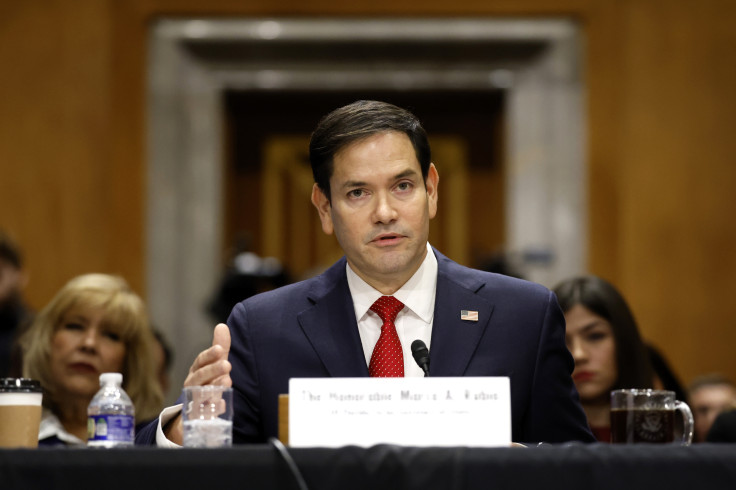
Immigration will be at the center of Secretary of State Marco Rubio's first overseas trip: he is expected to travel to five Latin American countries whose population comprise a significant portion of those seeking to enter the United States.
Concretely, Rubio is set to visit Panama, Guatemala, El Salvador, Costa Rica and the Dominican Republic, the State Department said. ABC News reported that the former senator will likely seek for the countries to take back their deportees and, in some cases, people from third countries as well.
"Our diplomatic relations with other countries, particularly in the Western Hemisphere, will prioritize securing America's borders, stopping illegal and destabilizing migration, and negotiating the repatriation of illegal immigrants," Rubio said in a statement on Wednesday.
He added that the department will "no longer undertake any activities that facilitate or encourage mass migration." In that context, the Trump administration is closing processing offices established under President Biden.
The offices, located in Colombia, Costa Rica, Ecuador, and Guatemala, were part of the Safe Mobility Initiative, which sought to deter migrants from crossing the southern U.S. border illegally by providing alternatives such as refugee resettlement, family-based visas, work visas, and humanitarian parole.
Internal State Department documents obtained by CBS News describe the closures as part of a "broader effort to assess how the United States manages migration processes to serve U.S. national interests." The decision aligns with President Trump's executive order suspending the U.S. Refugee Admissions Program, which allowed some migrants fleeing conflict or persecution to seek entry after thorough security, medical, and background screenings.
Getting countries to take back deportees might prove more challenging in some places than others. Some, like Guatemala, have reportedly showed willingness to take deportees from third countries, according to a Reuters report from December. The decision comes as the administration of Bernardo Arevalo de Leon seeks to have smooth relations with Trump.
Concretely, Guatemala would receive citizens from other Central American nations, which constitute a large portion of those making their way up north. "We want to be part of the solution," a Guatemalan official who requested anonymity told Reuters.
Mexico is also gearing up to receive scores of nationals, with the government led by President Claudia Sheinbaum is already implementing a plan called "Mexico Embraces You," which, among other things, provides returnees with cash cards worth about $100.
The initiative also includes busing people to their hometowns, medical attention, and enrolling returnees in social welfare programs. The effort spans across the government, with 34 federal agencies and 16 state governments involved.
In contrast, Honduran President Xiomara Castro is threatening to shut down the U.S. military base in the country if the administration carries out mass deportations of the country's nationals.
In Panama, Rubio is also expected to address an issue that has captured global headlines and become a point of contention: the Panama Canal. During his inauguration speech on Monday, Trump vowed to take back the Panama Canal, saying that the U.S. has "been treated very badly by this foolish gift that should have never been made," referring to the 1977 agreement with the Latin American country that would eventually lead to Panama retaining full control of the canal after 1999.
In that context, Republican lawmakers in the U.S. Senate are taking steps to address the matter. Sen Eric Schmitt said he would introduce a resolution urging Panama to take action in response to what they view as China's growing influence in the region.
© 2025 Latin Times. All rights reserved. Do not reproduce without permission.





